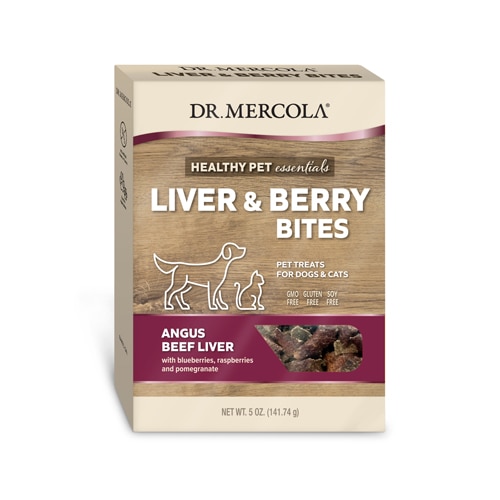
Dr. Mercola Healthy Pet Treats For Dogs & Cats Beef Liver & Berry Bites Description
-
Healthy Pet Essentials
-
Angus Beef Liver with Blueberries, Raspberries and Pomegranate
-
Pet Treats for Dogs & Cats
-
GMO Free
-
Gluten Free
-
Soy Free
What’s better than watching your dog react to the question, “Do you want a treat?
Whether it’s the instant tail wag, wide eyes or a full-body wiggle, it’s clear your dog loves treats, and her excitement makes you love giving them to her.
Treats are great rewards when training, but realistically many dogs are being fed the “just because we love them” treat a few extra times a week, or for some, even a day. Treats, no matter the occasion, can add up and lead to health issues, especially when they’re made with poor ingredients.
Feeding your dog low-quality snacks regularly can undo all the hard work you’ve done to take control of her health.
Spoil your dog the right way by serving her these species appropriate, protein-rich bites as a special snack between meals or the perfect treat for training.
Our tasty Liver & Berry Bites:
-
Contain 100% premium-quality beef liver.
-
Contain strictly U.S. born and bred ingredients.
-
Includes high levels of antioxidants from the organic pomegranates, blueberries and raspberries found inside of them.
-
Are free from potentially harmful fillers and rendered animal by-products.
Support a long, happy and healthy life for your dog by treating her to these savory, human-grade, bite-sized treats, and stock up on your supply today.
*These statements have not been evaluated by the Food and Drug Administration. This product is not intended to diagnose, treat, cure, or prevent any disease.
| Amount Per Serving | % Daily Value | |
| Guaranteed Analysis | ||
| Crude Protein (min)........52% | ||
| Crude Fat (Min)........8% | ||
| Crude Fiber (Max)........1.2% | ||
| Moisture (Max)........5.3% | ||
| Calorie Content (Calculated): 3616 kcal ME/kg, 15.2 ME/treat | ||
Intended for intermittent or supplemental feeding only. For animal use only. Always supervise when feeding and provide fresh drinking water.



